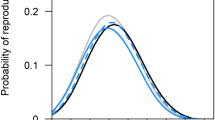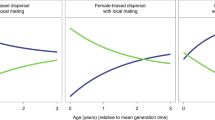Abstract
The evolution of helping, in which some individuals forfeit their own reproduction and help others to reproduce, is a central problem in evolutionary biology. Recently proposed insurance-based mechanisms rely on a pre-existing life history with a long period of offspring dependency relative to the short life expectancies of adult carers1,2,3,4: a lone mother's offspring are doomed if she dies young, whereas after a helper dies, other group members can finish rearing the offspring5,6. A critical question, however, is how this life history could evolve in ancestral non-social populations, as offspring survival would then depend on a single, short-lived carer. Here, we resolve this paradox by focusing on the extended parental care inherent in prolonged dependency. We show experimentally that in non-social wasps, extended care can significantly reduce the impact of interspecific parasites. Under extended care, offspring are less vulnerable by the time they are exposed to parasites, and costs of parasitism are reduced because mothers have the option to terminate investment in failing offspring. By experimentally simulating aspects of extended care in a species where it is lacking, we demonstrate that neither benefit requires specialized behaviour. Such benefits could therefore offset the disadvantage of prolonged dependency in non-social species, thereby facilitating the evolution of helping.
This is a preview of subscription content, access via your institution
Access options
Subscribe to this journal
Receive 51 print issues and online access
$199.00 per year
only $3.90 per issue
Buy this article
- Purchase on Springer Link
- Instant access to full article PDF
Prices may be subject to local taxes which are calculated during checkout


Similar content being viewed by others
References
Queller, D. C. in Natural History and Evolution of Paper-wasps (eds Turillazzi, S. & West-Eberhard, M. J.) 218–234 (Oxford Univ. Press, Oxford, 1996)
Queller, D. C. Extended parental care and the origin of eusociality. Proc. R. Soc. Lond. B 256, 105–111 (1994)
Gadagkar, R. Evolution of eusociality: the advantage of assured fitness returns. Phil. Trans. R. Soc. Lond. B 329, 17–25 (1990)
Reeve, H. K. in The Social Biology of Wasps (eds Ross, K. G. & Matthews, R. W.) 99–148 (Cornell Univ. Press, Ithaca, 1991)
Field, J., Shreeves, G., Sumner, S. & Casiraghi, M. Insurance-based advantage to helpers in a tropical hover wasp. Nature 404, 869–871 (2000)
Shreeves, G., Cant, M. A., Bolton, A. & Field, J. Insurance-based advantages for subordinate co-foundresses in a temperate paper wasp. Proc. R. Soc. Lond. B 270, 1617–1622 (2003)
Bohart, R. M. & Menke, A. S. Sphecid Wasps of the World (Univ. California Press, Berkeley, 1976)
Hunt, J. H. Trait mapping and salience in the evolution of eusocial vespid wasps. Evolution 53, 225–237 (1999)
Baerends, G. P. Fortpflanzungsverhalten und Orientierung der Grabwespe Ammophila campestris Jur. Tijdschr. Entomol. 84, 68–275 (1941)
Samuel, C. T. Factors Affecting Colony Size in the Stenogastrine Wasp Liostenogaster flavolineata. Thesis, Univ. Malaya (1987)
Fabre, J.-H. The Hunting Wasps (Hodder & Stoughton, London, 1916)
Evans, H. E. Observations on the nesting behaviour of digger wasps of the genus Ammophila. Am. Midl. Nat. 62, 449–473 (1959)
Field, J. Intraspecific parasitism and nesting success in the solitary wasp Ammophila sabulosa. Behaviour 110, 23–46 (1989)
Evans, H. E. The Comparative Ethology and Evolution of the Sand Wasps (Harvard Univ. Press, Cambridge, Massachusetts, 1966)
Wcislo, W. T. Parasitism rates in relation to nest site in bees and wasps (Hymenoptera: Apoidea). J. Insect Behav. 9, 643–656 (1996)
O'Neill, K. M. Solitary Wasps (Cornell Univ. Press, Ithaca, 2001)
Rosenheim, J. A. Nesting behavior and bionomics of a solitary ground-nesting wasp, Ammophila dysmica (Hymenoptera: Sphecidae): influence of parasite pressure. Ann. Entomol. Soc. Am. 80, 739–749 (1987)
Hager, B. J. & Kurczewski, F. E. Cleptoparasitism of Ammophila harti (Fernald) (Hymenoptera: Sphecidae) by Senotainia viligans Allen, with observations on Phrosinella aurifacies Downes (Diptera: Sarcophagidae). Psyche (Stuttg.) 92, 7451–7462 (1985)
Field, J. Alternative nesting tactics in a solitary wasp. Behaviour 110, 219–243 (1989)
Trumbo, S. T. in Parental Care: Evolution, Mechanisms and Adaptive Significance (eds Rosenblatt, J. S. & Snowdon, C. T.) 3–51 (Academic, London, 1996)
Wyatt, T. D. & Foster, W. A. Parental care in the subsocial intertidal beetle Bledius spectabilis, in relation to parasitism by the ichneumonid wasp, Barycnemis blediator. Behaviour 110, 76–92 (1989)
Godfray, H. C. J. Parasitoids (Princeton Univ. Press, New Jersey, 1994)
Wyatt, T. D. & Foster, W. A. Leaving home: predation and the dispersal of larvae from the maternal burrow of Bledius spectabilis, a subsocial intertidal beetle. Anim. Behav. 38, 778–785 (1989)
Queller, D. C. & Strassmann, J. E. Kin selection and social insects. Bioscience 48, 165–175 (1998)
Cowan, D. P. in The Social Biology of Wasps (eds Ross, K. G. & Matthews, R. W.) 33–73 (Cornell Univ. Press, Ithaca, 1991)
Michener, C. D. The Bees of the World (John Hopkins Univ. Press, Baltimore, 2000)
Schwarz, M. P., Bull, N. J. & Cooper, S. J. B. Molecular phylogenetics of allodapine bees, with implications for the evolution of sociality and progressive rearing. Syst. Biol. 52, 1–14 (2003)
Carpenter, J. M. in The Social Biology of Wasps (eds Ross, K. G. & Matthews, R. W.) 7–32 (Cornell Univ. Press, Ithaca, 1991)
Hunt, J. H. in Nourishment and Evolution in Insect Societies (eds Hunt, J. H. & Nalepa, C. A.) 211–244 (Westview, Boulder, 1994)
Beekman, M., Komdeur, J. & Ratnieks, F. L. W. Reproductive conflicts in social animals: who has power? Trends Ecol. Evol. 18, 277–282 (2003)
Acknowledgements
We thank E. Almond, M. Cant, C. Bridge, A. Cronin, W. Foster and G. Shreeves for advice and comments, and English Nature for access to the study sites. S.B. was funded by a Nuffield Foundation undergraduate research bursary.
Author information
Authors and Affiliations
Corresponding author
Ethics declarations
Competing interests
The authors declare that they have no competing financial interests.
Rights and permissions
About this article
Cite this article
Field, J., Brace, S. Pre-social benefits of extended parental care. Nature 428, 650–652 (2004). https://doi.org/10.1038/nature02427
Received:
Accepted:
Issue Date:
DOI: https://doi.org/10.1038/nature02427
This article is cited by
-
Nesting biology and social organisation of a silk wasp (Microstigmus rosae) from the North–West Ecuadorian Choco
Insectes Sociaux (2023)
-
Sex bias in parental care is associated with brood age and fledglings’ growth rate in Western Bluebirds Sialia mexicana
Journal of Ornithology (2021)
-
The evolution of parental care strategies in subsocial wasps
Behavioral Ecology and Sociobiology (2020)
-
The evolution of simultaneous progressive provisioning revisited: extending the model to overlapping generations
Behavioral Ecology and Sociobiology (2017)
-
Termite’s royal cradle: does colony foundation success differ between two subterranean species?
Insectes Sociaux (2017)
Comments
By submitting a comment you agree to abide by our Terms and Community Guidelines. If you find something abusive or that does not comply with our terms or guidelines please flag it as inappropriate.



